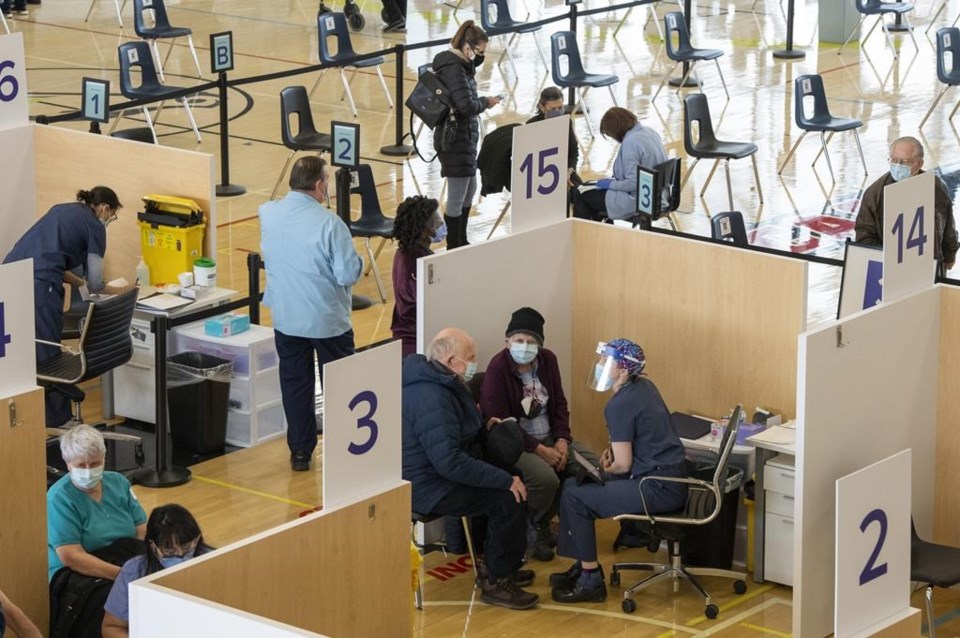TORONTO — Ontario's primary care doctors are still awaiting specifics on how they will help administer the Oxford-AstraZeneca vaccine, a group representing the physicians said Tuesday as the first batches of the recently approved shot arrived in the province.
The president of the Ontario Medical Association said her group has discussed family doctors' involvement with the head of the province's vaccine effort but details on when physicians can expect to receive doses and how many will arrive have yet to be provided.
"The planning has started, but we don't have any of the specifics around who or how," Dr. Samantha Hill said in an interview.
"Having those specifics and certainty would certainly help everyone with the planning and the communication."
Ontario's health minister said 190,000 doses of Oxford-AstraZeneca were to arrive in Ontario on Tuesday.
Many of those will go to more than 300 pharmacies in Toronto, Kingston and Windsor for a pilot project launching Friday that will target residents aged 60 to 64.
A portion of the Oxford-AstraZeneca doses are also expected to go to primary care physicians who will administer them to their patients, Hill said.
Some doctors have already started pulling information from their patient lists to make sure the vaccines go to the right people when supply arrives, but "it is a little bit of working in the dark right now," she said.
She noted that family doctors have capacity to administer more than 1,000 shots per week based on experience with flu vaccines, and can use their relationships with patients to reach people who might be missed by public announcements about the province's vaccination effort.
"It would be a poor choice to not leverage the use of the family physicians," Hill said. "As soon as we have more details, we will share them."
Liberal Health Critic John Fraser expressed worry Tuesday about the province being able to distribute the Oxford-AstraZeneca doses before the shots expire, noting that the pharmacies meant to administer many of them had yet to be named publicly as of Tuesday morning.
"I'm not confident," he said. "It would be good if they could explain mathematically how they're going to achieve that even in the broadest sense."
Also on Tuesday, Ontarians learned that they would have to book vaccination appointments through different systems depending on where they live.
At least six public health units will continue using individual booking systems that started taking appointments while a provincial portal remains under development, the government said.
The provincewide system, consisting of an online portal and phone line, is set to go live on March 15.
"They already have websites that are up and running and are serving their own purposes," Health Minister Christine Elliott said of the health units that would keep using their own systems.
"I think the fact that we will have administered a million vaccines by the end of this week speaks for itself about the success."
Elliott reiterated Tuesday that the government had not yet launched its site because it wanted to ensure it wouldn't crash once it was live.
Several public health units started using their own booking systems recently when they moved ahead with vaccinating eligible residents, including those aged 80 and older. Wellington-Dufferin-Guelph is one of the health units that will keep using its own system, the government said.
The vaccine rollout is expanding as the last three Ontario regions under a stay-at-home order saw restrictions loosen this week.
Toronto and Peel Region are now in the strictest "grey lockdown" category of the province's pandemic restrictions framework, which allows previously shuttered retailers to open with capacity limits. North Bay has moved to the second-strictest "red" category.
NDP Leader Andrea Horwath said she's worried about a possible third wave taking hold in communities where restrictions have lifted but vaccinations are still ramping up.
"It really is this push and pull between vaccines arriving getting into people's arms and the variants spreading through communities," she said.
"We flagged that opening up too soon, creating too much space for the variants to take hold and spread, could lead us into a third wave. And I'm still very concerned about that."
This report by The Canadian Press was first published March 9, 2021.
Holly McKenzie-Sutter, The Canadian Press
